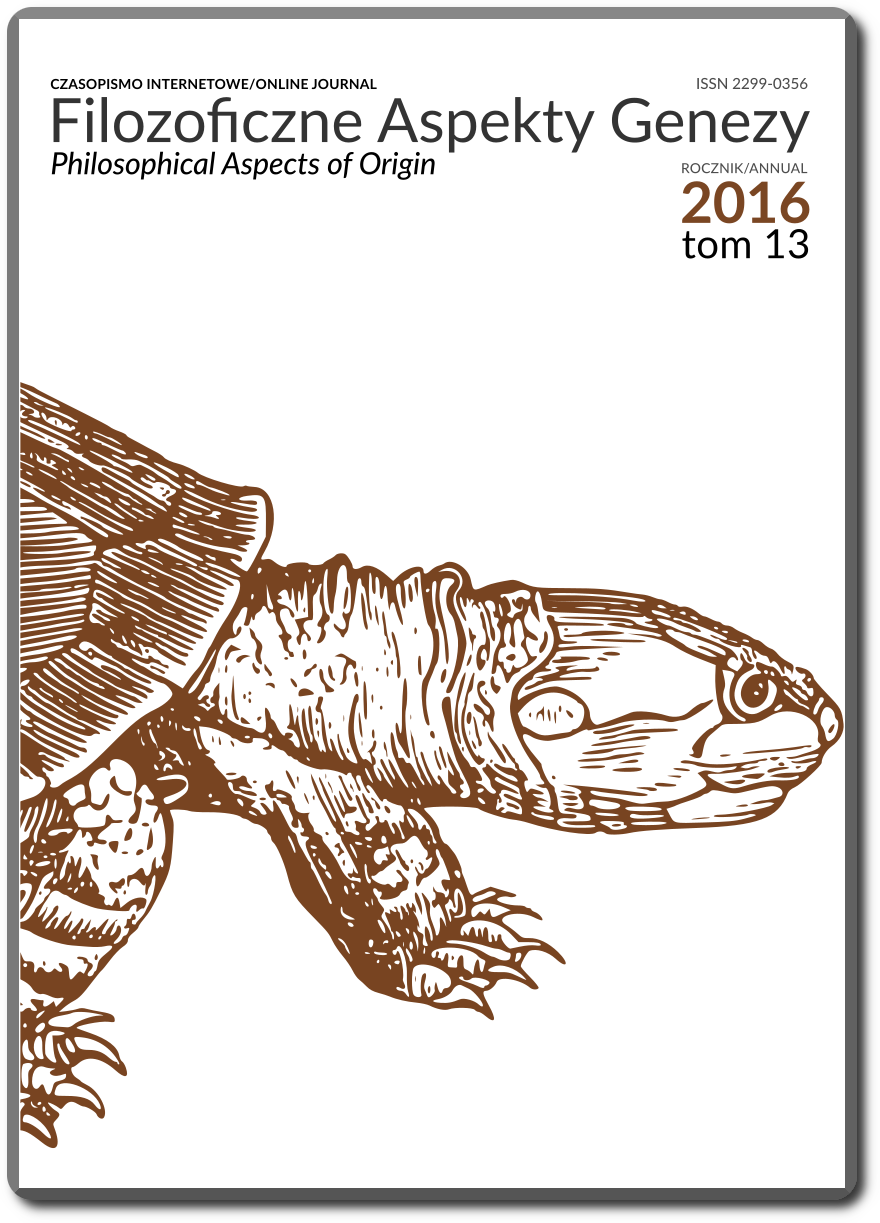Opublikowane 24.05.2021
Wersje
- 24.02.2023 - (2)
- 24.05.2021 - (1)
Słowa kluczowe
- teologia naturalna,
- naturalizm metodologiczny,
- projekt,
- stworzenie,
- teizm
- subtelne zestrojenie,
- zakazy,
- regres eksplanacyjny,
- rekurencja eksplanacyjna,
- brzytwa Ockhama ...More

Utwór dostępny jest na licencji Creative Commons Uznanie autorstwa 4.0 Międzynarodowe.
Jak cytować
Abstrakt
Teologia naturalna nie cieszyła się szczególnym poważaniem przez ostatnie 150 lat. Najnowsze ustalenia zarówno w dziedzinie nauki, jak i filozofii nauki zapewniają jednak pewne nowe możliwości i środki. W artykule analizuję pewne obszary i struktury, w ramach których objawić się może (w zasadzie) potencjał teologii naturalnej. Następnie argumentuję, że współczesna broń przeciwko próbom rzeczowego powiązania nauki i religii — naturalizm metodologiczny — nie tylko nie stanowi nienaruszalnej normy, nie wykluczając zatem możliwości uprawiania autentycznej teologii naturalnej, ale też może nieść niefortunne konsekwencje teologiczne.
Downloads
Bibliografia
- Atkins Peter, „Awesome versus Adipose”, Free Inquiry 1998, vol. 18, no. 2.
- Atkins Peter, The Creation, Freeman, San Francisco 1981.
- Bacon Francis, Of the Proficience and Advancement of Learning, Great Books of the Western World, vol. 30, assoc. ed., Mortimer Adler, Encyclopedia Britannica, Chicago 1952.
- Barrow John and Tipler Frank, The Anthropic Cosmological Principle, Oxford University Press, Oxford 1986.
- Boyle Robert, A Disquisition about the Final Causes of Natural Things; Wherein It Is Inquir’d Whether, and (If at All) with What Cautions, a Naturalist Should Admit Them?, 1688.
- Boyle Robert, The Excellency of Theology, Compared with Natural Philosophy, w: Robert Boyle on Natural Philosophy…, s. 149-150.
- Bradley Walter, „The «Just So» Universe”, Touchstone July/August 1990, s. 70-75.
- Brooke John Hedley, Science and Religion, Cambridge University Press, Cambridge 1991.
- Clarke Samuel, A Demonstration of the Being and Attributes of God, ed. Ezio Vialati, Cambridge University Press, Cambridge 1998.
- Collins Robin, „Does the Many-Universe Hypothesis Really Explain the Fine-Tuning?”, http://tiny.pl/g93zg (30.08.2016).
- Crick Francis, Of Molecules and Men, University of Washington Press, Seattle 1966.
- Crick Francis, What Mad Pursuit, Basic, New York 1988.
- Darwin Francis (ed.), Autobiography of Charles Darwin and Selected Letters, Dover, New York 1958.
- Darwin Karol, Autobiografia i wybór listów. Dzieła wybrane, t. 8, przeł. A. Iwanowska, A. Krasicka, J. Półtowicz i S. Skowron, Biblioteka Klasyków Biologii, Państwowe Wydawnictwo Rolnicze i Leśne, Warszawa 1960.
- Davies Paul, Are We Alone?, Basic, New York 1995.
- De Duve Christian, Vital Dust: Life as a Cosmic Imperative, Basic, New York 1995.
- De Vries Paul, „Naturalism in the Natural Sciences: A Christian Perspective”, Christian Scholar’s Review 1986, vol. 15, no. 4, s. 388-396.
- De Vries Paul, „Naturalizm w naukach przyrodniczych. Perspektywa chrześcijańska”, przeł. Radosław Plato, Filozoficzne Aspekty Genezy 2011, t. 8, s. 121-135, http://www.nauka-a-religia.uz.zgora.pl/images/FAG/2011.t.8/art.08.pdf (12.08.2016).
- Duhem Pierre, Aim and Structure of Physical Theory, Princeton University Press, Princeton 1954.
- Eldredge Niles, The Monkey Business, Washington Square, New York 1982.
- Gingerich Owen, „How Galileo Changed the Rules of Science”, Sky and Telescope 1993, vol. 85, no. 3, s. 32-36.
- Goldstein Herbert, Classical Mechanics, Addison-Wesley, Cambridge 1950.
- Hall Norman and Hall Lucia, „Is the War Between Science and Religion Over?”, The Humanist May/June 1986, s. 26-28.
- Harrison Edward, Masks of the Universe, Macmillan, New York 1985.
- Highfield Roger, „DNA Pioneers Lash Out at Religion”, London Daily Telegraph 24 March 2004.
- Horgan John, Koniec nauki, czyli o granicach wiedzy u schyłku ery naukowej, przeł. Michał Tempczyk, Prószyński i S-ka, Warszawa 1999.
- Huxley Thomas, „Review of Origin of Species”, Westminster Review 1860, vol. 17, s. 541-570.
- Knorr-Cetina Karin, The Manufacture of Knowledge, Pergamon, New York 1981.
- Kuhn Thomas S., Struktura rewolucji naukowych, przeł. Helena Ostromęcka i Justyna Nowotniak, Fundacja Aletheia, Warszawa 2001.
- Kultur der Gegenwart, 1915.
- Leslie John, Universes, Routledge, New York 1989.
- Lewontin Richard, „Billions and Billions of Demons”, New York Review of Books 9 January 1997, vol. 44, no. 1.
- Manson Neil (ed.), God and Design, Routledge, New York 2003.
- McMullin Ernan, „Indifference Principle and Anthropic Principle in Cosmology”, Studies in History and Philosophy of Science 1993, vol. 24, no. 3, s. 359-389.
- Murphy Nancey, „Phillip Johnson on Trial: A Critique of His Critique of Darwin”, Pennock (ed.), Intelligent Design Creationism…, s. 451-469.
- Oreskes Naomi, Shrader-Frechette Kristin, and Belitz Kenneth, „Verification, Validation and Confirmation of Numerical Models in the Earth Sciences”, Science 1994, vol. 263, no. 5147, s. 641-646.
- Pennock Robert (ed.), Intelligent Design Creationism and Its Critics, MIT Press, Cambridge 2001.
- Pennock Robert, „Naturalism, Evidence, and Creationism: The Case of Phillip Johnson”, w: Pennock (ed.), Intelligent Design Creationism…, s. 77-97.
- Pennock Robert, „Reply: Johnson’s Reason in the Balance”, w: pennock (ed.), Intelligent Design Creationism…, s. 103-107.
- Penrose Roger, Nowy umysł cesarza. O komputerach, umyśle i prawach fizyki, przeł. Piotr Amsterdamski, Wydawnictwo Naukowe PWN, Warszawa 2000.
- Planck Max, „Religion and Natural Science”, w: Planck, Scientific Autobiography…, s. 151-187.
- Planck Max, Scientific Autobiography and Other Papers, Williams and Norgate, London 1950.
- Plantinga Alvin, „Evolution, Neutrality, and Antecedent Probability: A Reply to McMullin and Van Till”, w: Pennock (ed.), Intelligent Design Creationism…, s. 197-236.
- Polanyi Michael, Science, Faith and Society, University of Chicago Press, Chicago 1964.
- Ratzsch Del, Nature, Design, and Science, Suny Press, Albany 2001.
- Ratzsch Del, „Nomo(theo)logical Necessity”, Faith and Philosophy 1987, vol. 4, no. 4, s. 383-402.
- Ratzsch Del, „Saturation, World-Ensembles, and Design”, w druku. (Artykuł ukazał się w: Faith and Philosophy 2005, vol. 22, no. 5, s. 667-686.)
- Robert Boyle on Natural Philosophy, ed. Marie Boas Hill, Bloomington, Indiana 1965.
- Ruse Michael, „Methodological Naturalism Under Attack”, w: Pennock (ed.), Intelligent Design Creationism…, s. 363-385.
- Scott Eugenie, „Creationism, Ideology, and Science”, Annals of the New York Academy of Science 24 June 1996, vol. 775.
- Scott Eugenie, „Darwin Prosecuted”, Creation/Evolution 1993, vol. 13, no. 2, s. 43.
- Smolin Lee, Życie Wszechświata. Nowe spojrzenie na kosmologię, przeł. Danuta Czyżewska, Tajemnice Nauki, Wydawnictwo Amber, Warszawa 1997.
- Swinburne Richard, „Prior Probabilities in the Argument from Fine Tuning”, w druku. (Artykuł ukazał się w: Faith and Philosophy 2005, vol. 22, no. 5, s. 641-653.)
- Van Der Meer Jitse (ed.), Facets of Faith and Science, vol. 2, University Press of America, Ancaster, Ontario, Pascal Centre and Lanham 1996.
- White Roger, „Fine-Tuning and Multiple Universes”, w: MANSON (ed.), God and Design…, s. 229-250.
- Wykstra Stephen, „Religious Beliefs, Metaphysical Beliefs, and Historiography of Science”, Osiris 2001, vol. 16, s. 29-46.
- Wykstra Stephen, „Should Worldviews Shape Science?: Toward an Integrationist Account of Scientific Theorizing”, w: Van Der Meer (ed.), Facets of Faith and Science…, s. 123-171.



